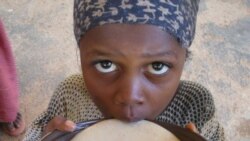Poor rains induced by the El Nino weather phenomenon have hampered food production, and diminishing reserves have left many people in rural parts of Zimbabwe short of essential supplies.
In an interview with AFP, UNICEF representative in Zimbabwe, Jane Muita said an estimated 50,000 children are in need of assistance, with 33,000 needing treatment for acute malnutrition.
Muita said Zimbabwe has not seen such high levels of malnutrition in the country in about 15 years, and noted that more has to be done to prevent the crisis from worsening.
“More than 15 years this is the first time we are seeing like this kind of thing, especially the condition of malnutrition that we are seeing in children,” said Muita. “It has not been seen before in this country."
She said there is also a chance that they’ve underestimated the number of those in need, as more research is pending.
“This assessment was done in January. If an assessment is done now, in April-May, it's going to show more districts and it’s going to show more numbers,” Muita said.
Muita said their research has been mostly confined to the rural areas in all 10 provinces, but indications are there is need in urban areas as well.
“The figures that we have are actually rural, we don't have any assessment that was done in urban areas. In fact at the moment we are thinking that it is important to look at the urban areas."
UNICEF has requested $21 million in aid to help feed Zimbabwe’s children. Other donors, including the World Food Program, have also appealed for aid on Zimbabwe’s behalf, to alleviate hunger.
Muita said she’s especially concerned about the onset of malnutrition due to hunger, a condition she described as dangerous.
"Malnutrition is a very dangerous condition for children to have, specifically in the age before they reach the age of two. We are talking about under 5 malnutrition like this moment we are talking about acute malnutrition which we can deal with and by feeding children by making sure that they are not suffering from diarrhea.”
Muita explained that one of the long term effects of malnutrition that many children in Zimbabwe are exposed to is stunting.
She said 28% of Zimbabweans suffer from this, and that failure to address the problem before they pass the age of two, can result even in death.
“Stunting is a condition that is a chronic form of malnutrition, but has the biggest impact before the age of two,” Muita elaborated. “If we don't intervene before the age of two, they live with that problem, so they are stunted. But not only are they stunted, but there are other impacts of malnutrition that are lifelong, including intelligence, their performance in school is affected and they are also prone to death from other illnesses."
In acknowledgement of the severe situation, the government recently declared a state of disaster in the country, and has appealed for food aid. An estimated four million people in Zimbabwe need food assistance.






